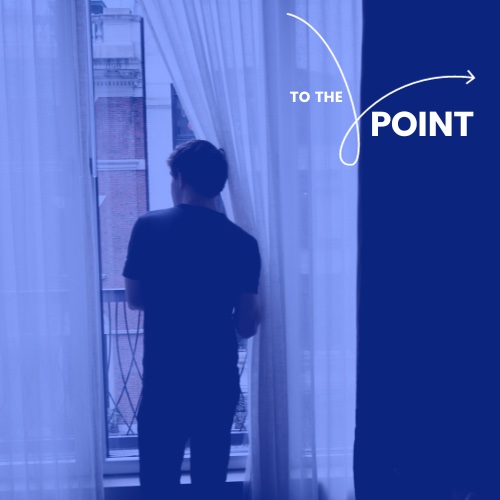Surgeon General Raises Alarm: Is Loneliness a National Crisis?

To the Point provides insights from AU faculty experts on timely questions covering current events, politics, business, culture, science, health, sports, and more. Each week we ask one professor just one critical question about what’s on our minds.
This spring, Surgeon General Vivek Murthy released an advisory illuminating the dangers of loneliness. “It is associated with a greater risk of cardiovascular disease, dementia, stroke, depression, anxiety, and premature death. The mortality impact of being socially disconnected is similar to that caused by smoking up to 15 cigarettes a day, and even greater than that associated with obesity and physical inactivity,” he wrote in his introduction.
But Murthy went further, adding, “And the harmful consequences of a society that lacks social connection can be felt in our schools, workplaces, and civic organizations, where performance, productivity, and engagement are diminished.”
The effects of loneliness and isolation seem dire, not only for our physical and mental health, but also for the health of our nation. We turned to Jody Gan, professorial lecturer in American University’s Department of Health Studies, to learn more about loneliness and why the Surgeon General considers it an urgent health concern.
How serious is the “epidemic of loneliness” and what can be done?
The Beatles sang about “all the lonely people” way back in 1966, and the United Kingdom even created a “Minister of Loneliness” cabinet post in 2018. Here in the United States, Surgeon General Vivek Murthy has recently made loneliness and social connectedness his platform issue, just as past surgeon generals have alerted the nation to dangers around tobacco use and HIV/AIDS.
Before the COVID-19 pandemic, half of all adults in the US reported experiencing loneliness, including the Surgeon General himself. Societal trends involving technology, overwhelming work schedules, and neighborhood design all contribute to social disconnectedness. In addition, the number of adults reporting having close friends has been on the decline for years. From 1976-2019, the rate of loneliness among young adults increased every year, skyrocketing during the pandemic’s lockdowns and stay-at-home orders. It is an understatement to say that the pandemic brought social isolation to soaring new levels for all age groups. As operations return to normal, and we resume being back with other people, many of us are noticing the extra effort it takes to be social.
We need social networks to help buffer stress and maintain our physical and mental health. Julianne Holt-Lunstad (2010) was the first US researcher to publish a large-scale analysis of studies establishing poor social support as a major contributor to morbidity. Her research team found that loneliness can become a lifelong pattern with serious health implications that have been equated with the same risks of smoking 15 cigarettes a day. When people are socially disconnected, their risk of heart disease and stroke increases by almost one-third due to associated increases in obesity, elevated blood pressure, and high cholesterol. Laboratory research shows that social isolation increases cortisol and inflammation in the body, which also makes us more susceptible to illness. As you would suspect, loneliness is also associated with increased depression and anxiety. For older adults, social isolation raises the risk of developing dementia by 50 percent.
The Surgeon General’s advisory also recognizes the effects of loneliness on declining performance in the workplace and at school, along with diminished civic engagement. Murthy warns that when we are less invested in one another, we are more susceptible to polarization and less able to pull together to face the challenges that we cannot solve alone like climate change, gun violence, hate crimes, economic inequality, and even future pandemics.
How can we stem the tide of disconnectedness that is threatening our collective health? Murthy recommends investing in community institutions and structures that bring people together, such as recreation leagues, parks, libraries, and playgrounds, to foster a sense of belonging and allow individuals to reap the benefits associated with diverse connections. He also wants to mobilize our health care providers to screen for loneliness. And he recommends scaling back on social media and investing this time in developing relationships with friends, co-workers, and romantic partners. Murthy also speaks about the value of making time each day for a leisurely telephone check-in with a friend or family member.
As the winter approaches, to combat the seasonal tendency to hibernate alone in our comfy cocoons, we can work toward cultivating a culture of connection by trying some of these:
- Connecting with a friend or colleague over coffee.
- Exercising with a friend—there are added benefits from moving more with others.
- Joining a book group—read alone, but then join others to share your review and maybe a snack!
- Planning an outing with an old or new friend, from museums to walking or a hike.
- Attending live theater and concerts—a chance to enjoy and appreciate the arts with others.
. Sharing Wordle, Spelling Bee, and/or Connections results with a friend each morning.
- Seeking out a faith-based group to create a sense of belonging around shared values and beliefs.
- Volunteering, giving back—this “happiness hack” provides a less awkward way to spend time with others while doing good.
More Resources
Here are some campus and community resources that can help with loneliness and social isolation: AU Center for Well-Being Programs and Psychological Services, AU Faculty and Staff Assistance Program, AHealthyU, Kay Spiritual Life Center.
988 Telephone Suicide and Crisis Hotline
About Jody Gan

With three decades of experience planning, implementing, and evaluating health programs, Gan enjoys sharing her experiences and passion for health and wellness while teaching public health and health promotion students the “tools of the trade.” Prior to joining the faculty at American University, she worked for federal and state governmental health agencies, developing health communication materials and community outreach strategies for a wide range of programs. For more than a decade, she coordinated prevention programs for college students at the University of Maryland and at American University. Gan remains committed to improving the health of adolescents and young adults and has enjoyed traveling to the mountains of Honduras to assist a rural community in its efforts to reduce teen pregnancy. Her current research interests include vaccine outreach and aquatic health. She is the immediate past president of the Maryland Public Health Association, one of the oldest state affiliates of the American Public Health Association.
